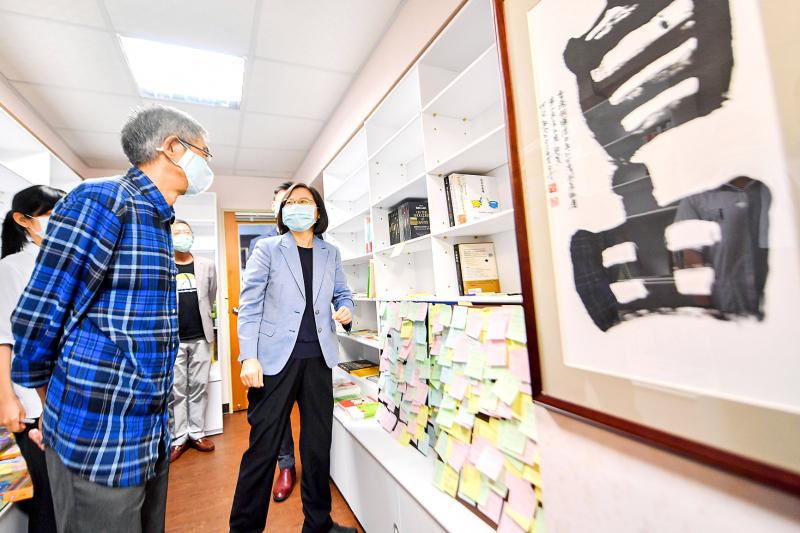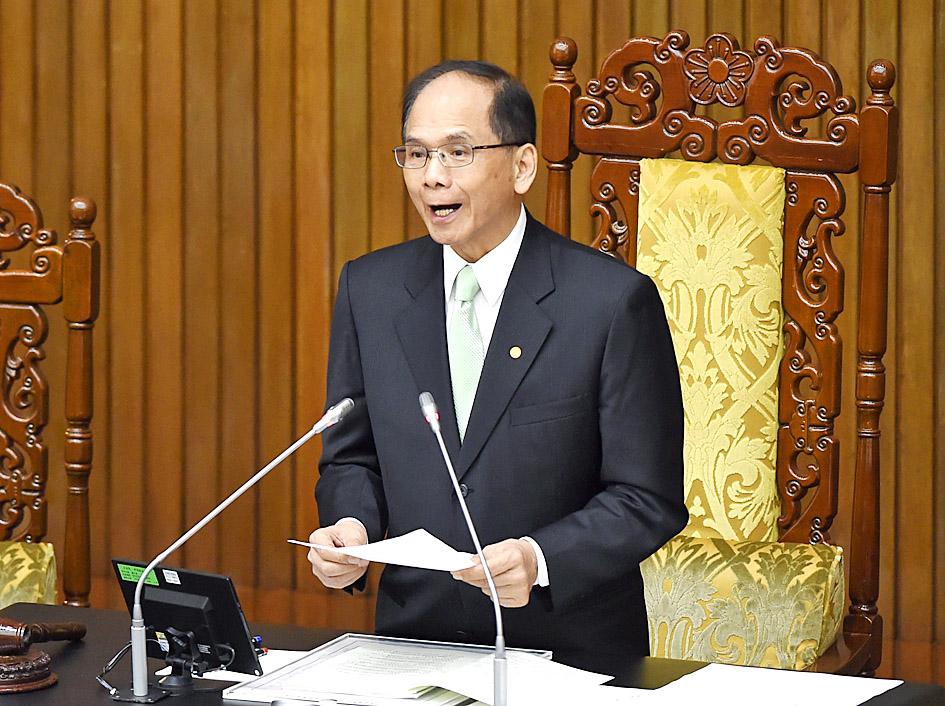Lawmakers across party lines yesterday issued a joint statement to “sternly condemn” China’s national security legislation for Hong Kong, while asserting their support for Hong Kongers in their pursuit of freedom and democracy.
The statement was signed by the Democratic Progressive Party (DPP), the Chinese Nationalist Party (KMT), the Taiwan People’s Party and the New Power Party caucuses, and was read by Legislative Speaker You Si-kun (游錫堃) during a plenary session at the Legislative Yuan in Taipei.
The legislation was passed by China’s National People’s Congress on Thursday, bypassing review by the Hong Kong Legislative Council, exacerbating the situation in Hong Kong and posing a threat to the freedoms and safety of Hong Kongers, the statement reads.

Photo: CNA
It disregards the Chinese Communist Party’s (CCP) promise to allow Hong Kongers a high level of autonomy until 2047, it reads.
The situation worries legislators across party lines, who have united to sternly condemn Beijing’s actions, it reads.
The caucuses stand with Hong Kongers in their quest for universal suffrage allowing them to directly elect the territory’s chief executive and legislative council members, it reads.

Photo: Chien Jung-fong, Taipei Times
They would support any communication channels established by Hong Kong residents to facilitate dialogue to restore order and attain sustainable economic growth in the territory, it reads.
Taiwan would, on existing mechanisms and the condition that its security can be upheld, provide humanitarian assistance to Hong Kongers whose freedoms and safety have come under threat, it reads.
The Legislative Yuan will closely watch developments in Hong Kong and, in the spirit of the Constitution, ask the Mainland Affairs Council to render a quarterly report on the special status conferred on Hong Kong to evaluate the territory’s autonomy in politics, economic activities and public issues, it reads.
The Legislative Yuan would review provisions of the Act Governing Relations with Hong Kong and Macau (香港澳門關係條例) if there are any changes of concern in Hong Kong society and ensure that agencies observe the act, it reads.
The Executive Yuan should diligently carry out a proposed action plan to provide Hong Kong residents with humanitarian assistance, and help those who have been persecuted in their pursuit of democracy and freedom, it reads.
Separately, independent Legislator Freddy Lim (林昶佐) announced the launch of the Taiwan Parliament Group for Hong Kong (台灣國會友好香港連線), which 48 lawmakers from across party lines have joined.
A ceremony in Taipei was attended by Taiwan Association for Human Rights secretary-general Shih Yi-hsiang (施逸翔) and Hong Kong Outlanders chairman Kuma Yung, as well as members of the Judicial Reform Foundation and the Business and Professionals Alliance for Hong Kong.
In the spirit of the joint statement, the group would support Hong Kongers by collaborating with the international community to fight against the despotism of the CCP, said Lim, who heads the group.
Meanwhile, President Tsai Ing-wen (蔡英文) yesterday visited Causeway Bay Books (銅鑼灣書店) to express her support for Lam Wing-kei (林榮基), who reopened the store in Taipei last month after it closed in Hong Kong due to political persecution.
Tsai thanked him for his work to support human rights and freedom in Hong Kong, and said her administration has set up a task force to assist people in Hong Kong whose security and freedom are at risk due to political factors.
Lam thanked the president and Taiwanese for their support of Hong Kong.
Additional reporting by CNA

Right-wing political scientist Laura Fernandez on Sunday won Costa Rica’s presidential election by a landslide, after promising to crack down on rising violence linked to the cocaine trade. Fernandez’s nearest rival, economist Alvaro Ramos, conceded defeat as results showed the ruling party far exceeding the threshold of 40 percent needed to avoid a runoff. With 94 percent of polling stations counted, the political heir of outgoing Costa Rican President Rodrigo Chaves had captured 48.3 percent of the vote compared with Ramos’ 33.4 percent, the Supreme Electoral Tribunal said. As soon as the first results were announced, members of Fernandez’s Sovereign People’s Party

MORE RESPONSIBILITY: Draftees would be expected to fight alongside professional soldiers, likely requiring the transformation of some training brigades into combat units The armed forces are to start incorporating new conscripts into combined arms brigades this year to enhance combat readiness, the Executive Yuan’s latest policy report said. The new policy would affect Taiwanese men entering the military for their compulsory service, which was extended to one year under reforms by then-president Tsai Ing-wen (蔡英文) in 2022. The conscripts would be trained to operate machine guns, uncrewed aerial vehicles, anti-tank guided missile launchers and Stinger air defense systems, the report said, adding that the basic training would be lengthened to eight weeks. After basic training, conscripts would be sorted into infantry battalions that would take

GROWING AMBITIONS: The scale and tempo of the operations show that the Strait has become the core theater for China to expand its security interests, the report said Chinese military aircraft incursions around Taiwan have surged nearly 15-fold over the past five years, according to a report released yesterday by the Democratic Progressive Party’s (DPP) Department of China Affairs. Sorties in the Taiwan Strait were previously irregular, totaling 380 in 2020, but have since evolved into routine operations, the report showed. “This demonstrates that the Taiwan Strait has become both the starting point and testing ground for Beijing’s expansionist ambitions,” it said. Driven by military expansionism, China is systematically pursuing actions aimed at altering the regional “status quo,” the department said, adding that Taiwan represents the most critical link in China’s

‘REALLY PROUD’: Nvidia would not be possible without Taiwan, Huang said, adding that TSMC would be increasing its capacity by 100 percent Nvidia Corp CEO Jensen Huang (黃仁勳) on Saturday praised and lightly cajoled his major Taiwanese suppliers to produce more to help power strong demand for artificial intelligence (AI), capping a visit to the country of his birth, where he has been mobbed by adoring fans at every step. Speaking at an impromptu press conference in the rain outside a Taipei restaurant, where he had hosted suppliers for a “trillion-dollar dinner,” named after the market capitalization of those firms attending, Huang said this would be another good year for business. “TSMC needs to work very hard this year because I need a lot